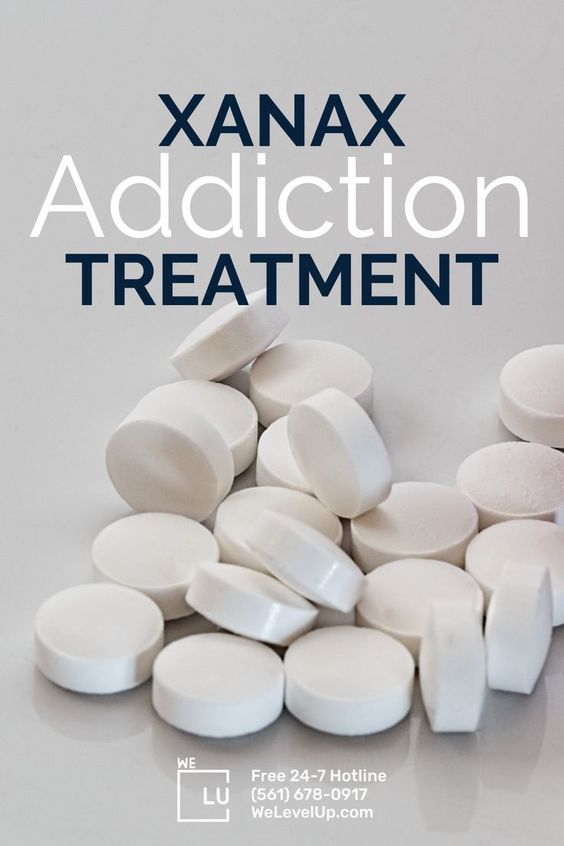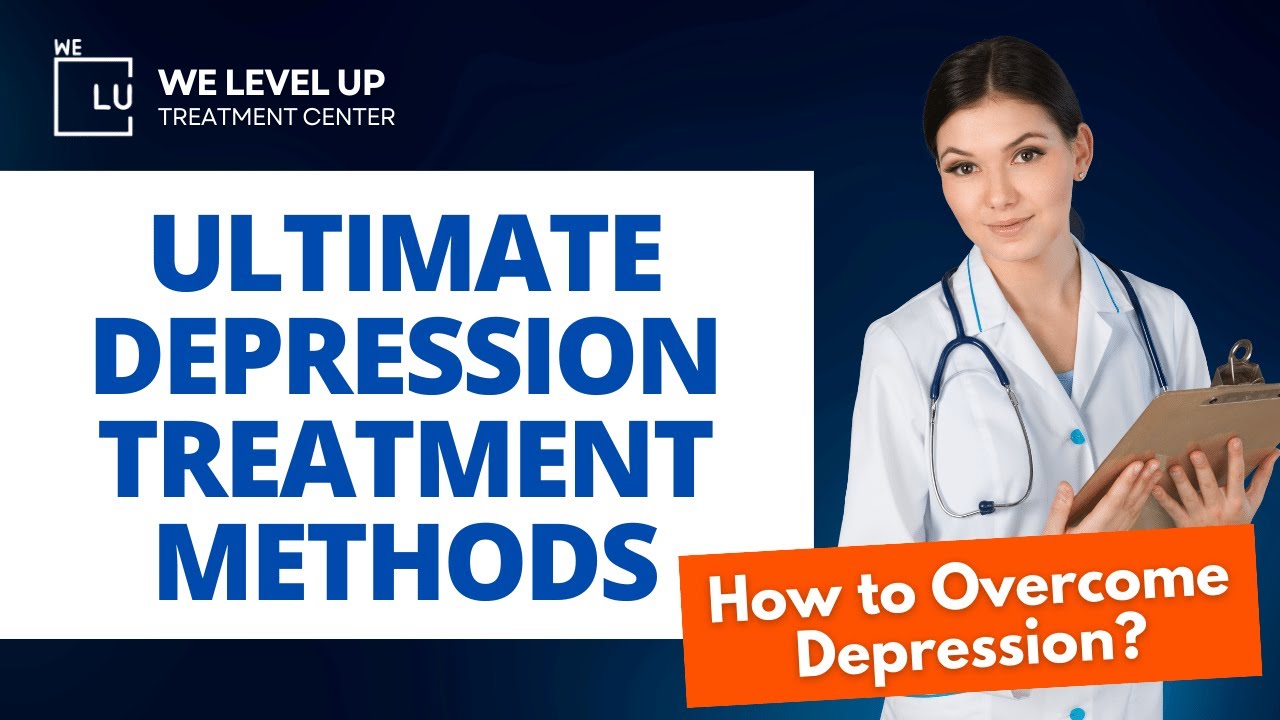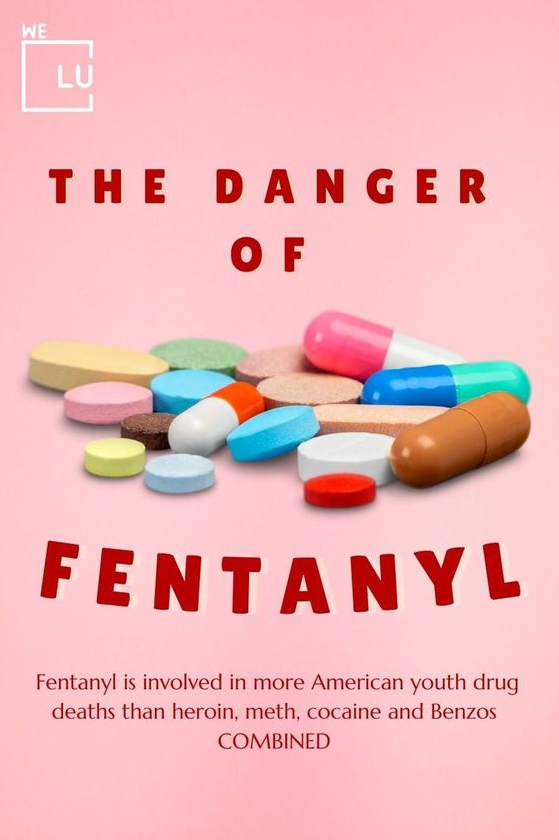In the US, the misuse of prescription drugs is becoming more common, including codeine addiction. Thirty-three million Americans are thought to take codeine recreationally each year, according to estimates. [1]
Codeine addiction and abuse can have destructive effects on one’s health as well as interpersonal relationships, much like any addiction. To get higher highs, many drug abusers start abusing harder and stronger drugs after growing accustomed to the moderate effects of codeine. To get higher highs, benzodiazepines and alcohol are also frequently used by those who are addicted to codeine. Moreover, a more subdued high and fewer adverse effects from stimulants may lead to others abusing codeine and other stimulant medicines.
Are you seeking rehab for codeine addiction near you? Get facts about codeine addiction treatment at We Level Up rehab center in Texas.
What is Codeine?
Codeine is a potent opioid categorized as a Schedule II drug due to its high risk of misuse and addiction.
A common ingredient in cough syrup is codeine, which treats mild to severe discomfort. Though there isn’t enough proof to support it, it is said to assist with coughs. It is more successful in treating diarrhea, primarily associated with IBS. Morphine, which is produced naturally and makes up around 2 percent of opium, is the product of the liver’s breakdown of codeine. After being broken down, codeine affects the brain’s reward region, resulting in emotions of happiness and contentment.
Why is Codeine Addictive?
While it serves medical purposes for pain relief and cough treatment, it activates brain receptors, changes pain perception, and boosts dopamine levels. Although beneficial for pain management, the elevation in dopamine can lead to a desire for continued use, potentially leading to opioid dependency.
Signs and Symptoms of Codeine Addiction
When someone takes codeine, it makes them feel euphoric and relaxed. But with continued use, the good feelings lessen, and the person would need more codeine to feel normal. This happens because the brain gets used to the drug, and higher doses are required for the same positive effects. As a result, the person relies on codeine not for pleasure but to avoid feeling ill. The symptoms of codeine dependence and addiction include:
- Increased tolerance.
- Withdrawal symptoms.
- Persistent desire to use codeine.
- Neglecting responsibilities.
- Failed attempts to quit.
- Spending excessive time obtaining or using codeine.
- Continued use despite negative consequences.
- Isolation from others.
- Changes in mood or behavior.
- Physical and psychological health decline.
How Addictive is Codeine?
Codeine, being an opiate, can lead to addiction. This has led to cough syrups with codeine being restricted and placed behind pharmacy counters.
In some countries, purchases are electronically tracked to monitor individual usage. In the US, the legal restrictions on codeine depend on its concentration in medications, with cough syrups falling into Schedule III or V.
Opiate addiction can develop rapidly and is challenging to overcome, influenced by individual body chemistry and tolerance levels.
Codeine, widely used for typical health issues like coughs, diarrhea, and pain, poses a risk of addiction for various groups. A study in Addictive Behaviors [2] identified higher codeine abuse among men, Native American and Hispanic individuals, urban students, and the LGBTQ+ community, particularly in the context of “purple drank” culture in the southern US. Young people, often new to drug use, may initially experiment with codeine, thinking it’s harmless. However, as tolerance develops, some may escalate to more potent opioids like Vicodin or heroin.
Concerningly, in 2014, 467,000 American adolescents used prescription painkillers nonmedically, with 168,000 growing addicted. Codeine abuse is also observed in polydrug users and those managing opioid withdrawal. Even prescribed users may unexpectedly face addiction if tolerance leads to higher doses or self-medication, considered a form of drug abuse.
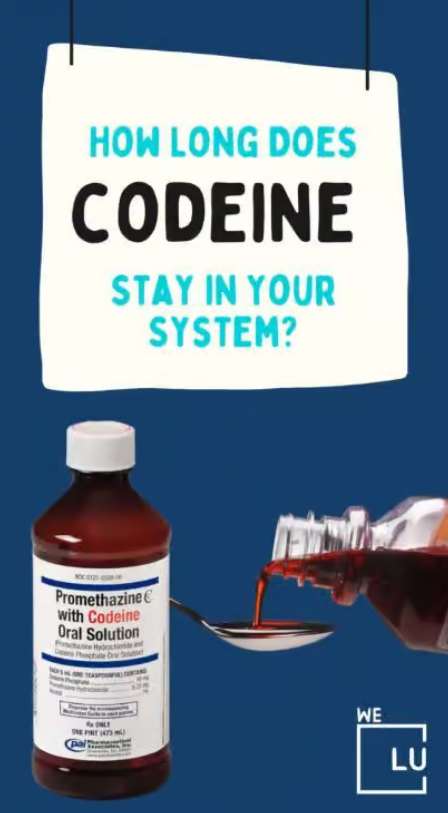
Skip To:
Learn More:
Short and Long-Term Effects of Codeine Addiction
Prolonged codeine abuse can lead to health issues like lung infections, bowel damage, sleep problems, irregular heart rate, and even brain damage. Beyond the physical harm, drug addiction significantly impacts life satisfaction. The constant focus on obtaining and using the drug strains relationships and responsibilities, leading to social isolation, family conflicts, and difficulties at school or work. Persistent drowsiness and mood swings make concentration challenging. These signs indicate substance addiction. Moreover, anhedonia, the inability to feel pleasure, is a common symptom of opiate addiction.
Short-Term Effects of Codeine
Codeine’s short-term effects depend on the user, weight, and the usual dosage.
- Euphoria.
- Drowsiness.
- Pain relief.
- Cough suppression.
- Relaxation.
- Nausea.
- Constipation.
- Itchiness.
- Reduced anxiety.
- Miosis (pupil constriction).
Long-Term Effects of Codeine
The consequences of opioid consumption on the body might worsen with increased usage and prolonged use. A person may suffer from a combination of the following long-term effects.
- Increased risk of addiction.
- Tolerance development.
- Liver damage.
- Respiratory issues.
- Gastrointestinal problems.
- Sleep disorders.
- Irregular heart rate.
- Cognitive impairment.
- Mood swings.
- Social and occupational dysfunction.
The potential effects of prolonged codeine use on your organs and central nervous system are a serious concern. Breathing slowly or shallowly during respiratory depression is more common due to the substantial effect codeine has on the respiratory system. Respiratory depression can still arise from a large amount of codeine, regardless of how long you’ve been taking it. Codeine may also damage your cardiovascular system, which might make pre-existing heart problems worse. An inflated sense of pain, known as hyperalgesia, can also result from long-term opiate use, such as using codeine.
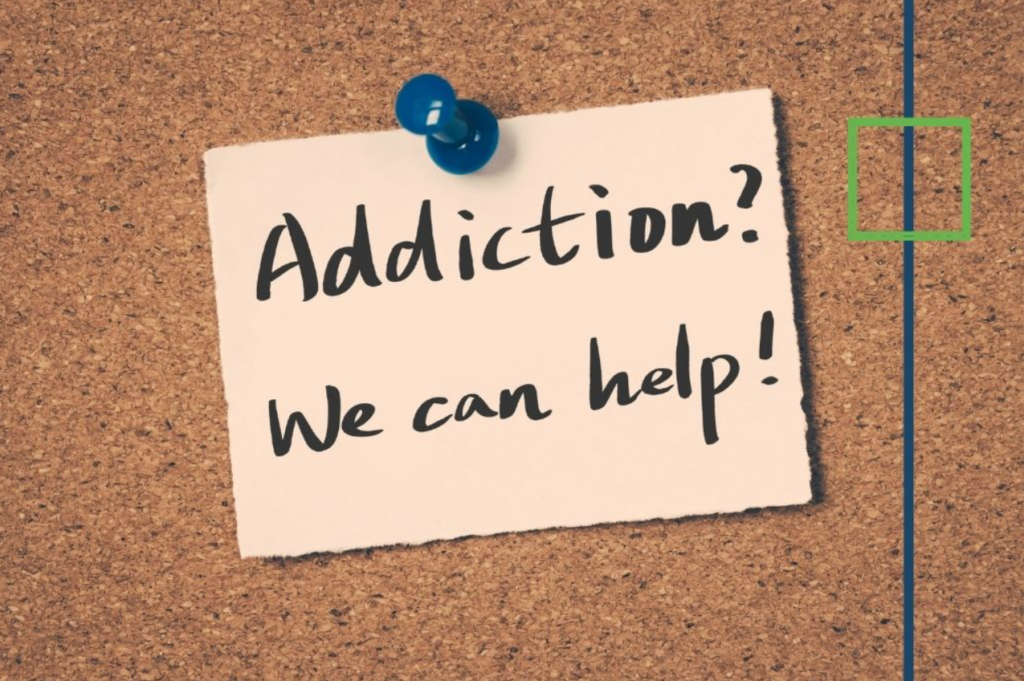
The Importance of Treating Codeine Addiction
Receiving therapy is necessary to recover control over your life, prevent chronic health problems, and overcome codeine addiction. In addition to treating the symptoms of addiction, successful therapy gives patients the resources and encouragement they need to lead long, drug-free lives. This road to recovery makes room for a brighter, healthier future by curing the body and mind.
Both psychological and physical treatments, including behavioral therapy, psychotherapy, and sometimes medication-assisted treatment, are utilized to treat codeine addiction. At every turn, a team of professionals dedicated to giving you a thorough rehabilitation strategy that considers your unique needs and issues will assist you.
If you’re seeking assistance with your codeine rehab journey, reach out to a We Level Up Texas treatment professional today—your call is free and confidential.
Get Help. Get Better. Get Your Life Back.
Searching for Accredited Drug and Alcohol Rehab Centers Near You? We Level Up Texas Is Opening Soon!
Even if you have failed previously and relapsed, or are in the middle of a difficult crisis, we stand ready to support you. Our trusted behavioral health specialists will not give up on you. When you feel ready or just want someone to speak to about therapy alternatives to change your life call us. Even if we cannot assist you, we will lead you to wherever you can get support. There is no obligation. Call our network hotline today.
FREE Addiction Hotline – Call 24/7The Dangers of Codeine Overdose
Overdosing on codeine can still be fatal, even if it is a milder opiate than others. The central nervous system, which regulates vital processes including breathing and heartbeat, is weakened by opioids. A codeine overdose can hastily reduce breathing, which lowers oxygen delivery to the brain, especially when paired with alcohol or other opioids. The afflicted person may have unconsciousness, brain damage, or possibly pass away as a result of this fast cell death that starts.
Other overdose symptoms of codeine include:
- Difficulty breathing.
- Extreme drowsiness.
- Constricted pupils.
- Confusion.
- Weakness and fatigue.
- Nausea and vomiting.
- Cold, clammy skin.
- Muscle weakness.
- Unconsciousness.
When alcohol or other drugs that depress the central nervous system are used with codeine, the risk of overdosing increases. Call 911 right away if you think someone may have overdosed so that they can provide help right away.
Furthermore, there is an increased risk of liver damage if codeine is combined with other drugs, such as acetaminophen, which is frequently done by persons trying to treat a terrible case of the flu or even opiate withdrawal symptoms. As acetaminophen is broken down, the liver is put under a lot of stress, which can lead to lasting liver damage if the liver also has to filter a lot of opiates at the same time.
Codeine Withdrawal Symptoms
Codeine withdrawal symptoms are far-fetched to be solely physical and may include psychological symptoms (i.e., cravings). Common symptoms include:
- Irritability.
- Anxiety.
- Insomnia.
- Sweating.
- Runny nose.
- Lack of energy.
- Muscle aches.
- Increased heart rate.
- Loss of appetite.
- Nausea and vomiting.
- Stomach cramps.
- Diarrhea.
- Dilated pupils.
- Chills.
- Fever.
These codeine withdrawal symptoms may appear to be a terrible case of flu to some people. It usually gets considerably worse for heavy users who take it for an extended period and may need medical assistance.
If a codeine addiction is detected, it is essential to speak with a doctor before attempting to quit. Withdrawal from opioids may be dehydrating and extremely uncomfortable without medical assistance, even if it’s not usually harmful. A deadly overdose can occur from relapsing because many people are unaware that even a brief hiatus from opioid use can lower tolerance and that restarting at the same dose from the previous effort to quit can be lethal.
Codeine Detox
Although fatal outcomes are not typical with opioid withdrawal, there are many reasons why medical detox can be beneficial.
When dependence or addiction to codeine is present, detox is inevitable once use has been discontinued. The detox course is when the substance leaves the body over days or weeks. As codeine is processed out of the body, the chemical balance in the body established during codeine use is once again disturbed. Hormone transitions cause disruptions in multiple physiological operations, and withdrawal symptoms begin to present.
The first phase in codeine addiction treatment is usually detox, when the client is medically monitored while they are progressively weaned off of codeine. It also guarantees a safer transition to sobriety by helping to manage symptoms of withdrawal.
Following detox, the recovery process continues.
Get addiction counseling that works. Discover professional help from We Level Up Texas’ addiction and mental health therapists. Start getting support with a free call to our addiction hotline.
Opening Soon! First-Class Facilities & Amenities
World-Class High-Quality Addiction & Mental Health Rehabilitation Treatment
Coming Soon! Rehab Centers TourRenowned Addiction Centers. Serene Private Facilities. Inpatient Rehab Programs Vary.
FREE Addiction Hotline – Call 24/7Proven recovery success experience, backed by a Team with History of:
- 15+ Years Experience
- 100s of 5-Star Reviews
- 10K+ Recovery Successes
- Low Patient to Therapist Ratio
- Onsite Medical Detox Center
- Comprehensive Dual-Diagnosis Treatment
- Complimentary Family & Alumni Programs
- Coaching, Recovery & Personal Development Events
Codeine Addiction Infographics
The infographic below focuses on codeine, a potent opioid classified as a Schedule II drug due to its high risk of misuse and addiction. Codeine is a common ingredient in cough syrup and is used to treat mild to severe pain. While there is insufficient evidence to support its effectiveness in treating coughs, it is more effective in managing diarrhea, particularly associated with irritable bowel syndrome (IBS). When codeine is metabolized in the liver, it is converted into morphine, a naturally occurring substance that makes up approximately 2 percent of opium. Once converted, morphine affects the brain’s reward center, leading to feelings of happiness and contentment.
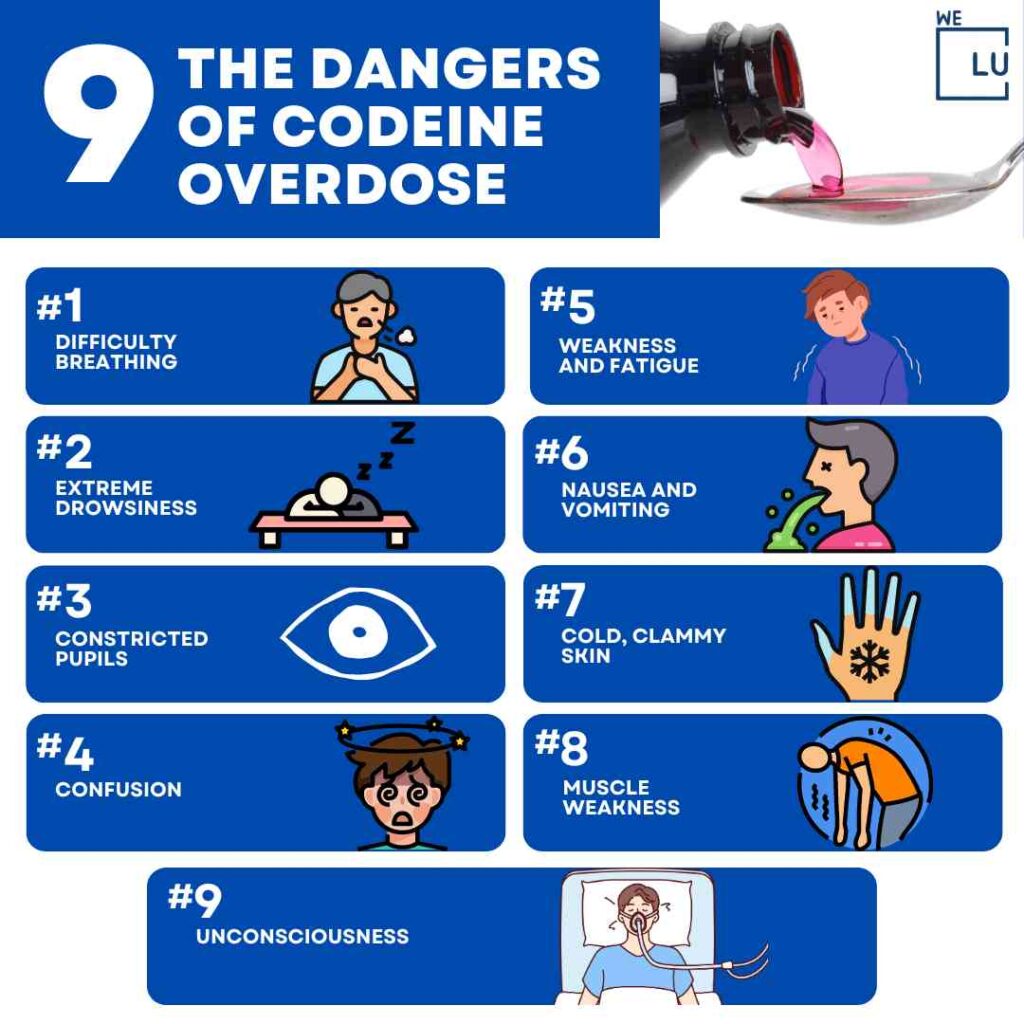
Embed the above “9 The Dangers of Codeine Overdose” Infographic to your Website. This infographic is provided by the We Level Up Addiction Treatment Center team. To use the above infographics, you agree to link back and attribute its source and owner at https://weleveluptx.com/codeine-addiction/
9 The Dangers of Codeine Overdose image link: https://weleveluptx.com/wp-content/uploads/2024/03/9-The-Dangers-of-Codeine-Overdose-Codeine-Addiction-Treatment-Codeine-Overdose-Codeine-Withdrawal-Symptoms-Codeine-Detox-1024×1024.jpg
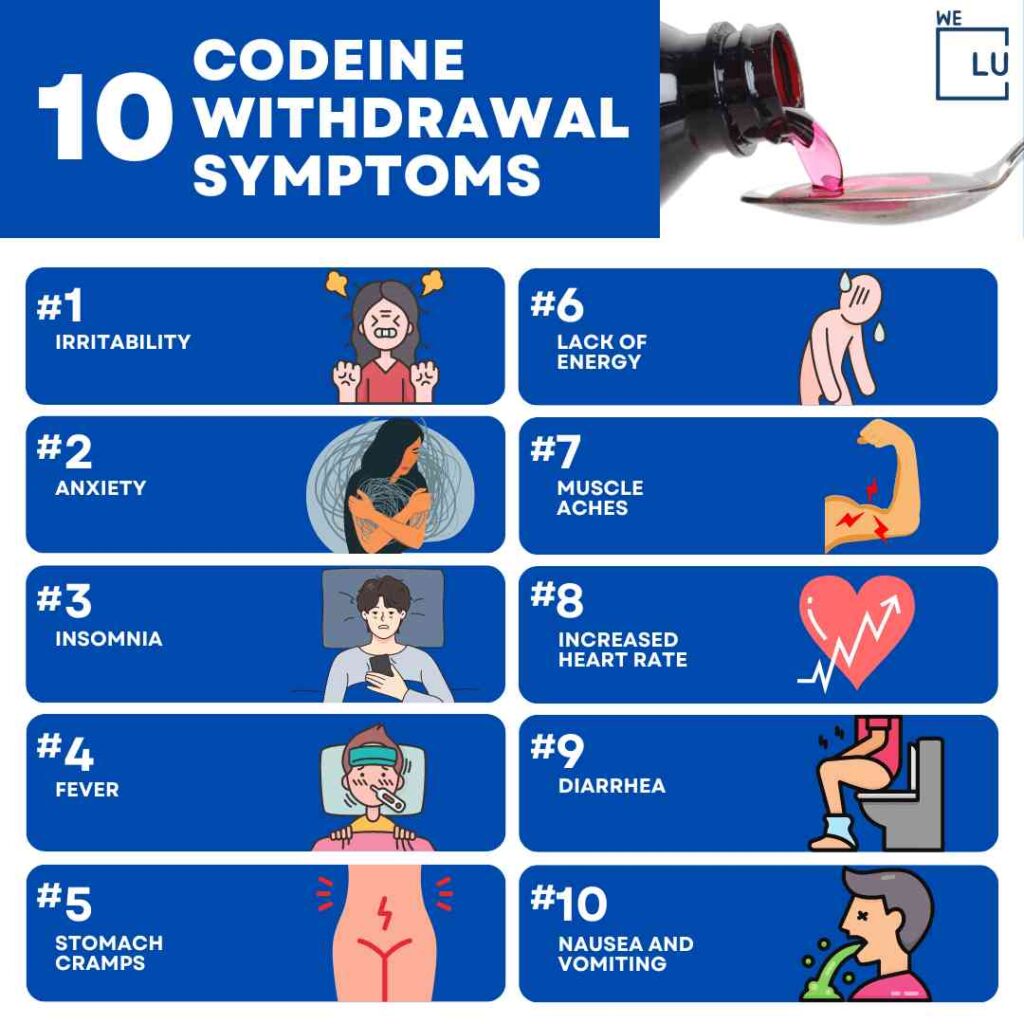
Embed the above “10 Codeine Withdrawal Symptoms” Infographic to your Website. This infographic is provided by the We Level Up Addiction Treatment Center team. To use the above infographics, you agree to link back and attribute its source and owner at https://weleveluptx.com/codeine-addiction/
10 Codeine Withdrawal Symptoms image link: https://weleveluptx.com/wp-content/uploads/2024/03/10-Codeine-Withdrawal-Symptoms-Codeine-Addiction-Treatment-Codeine-Overdose-Codeine-Withdrawal-Symptoms-Codeine-Detox-1024×1024.jpg
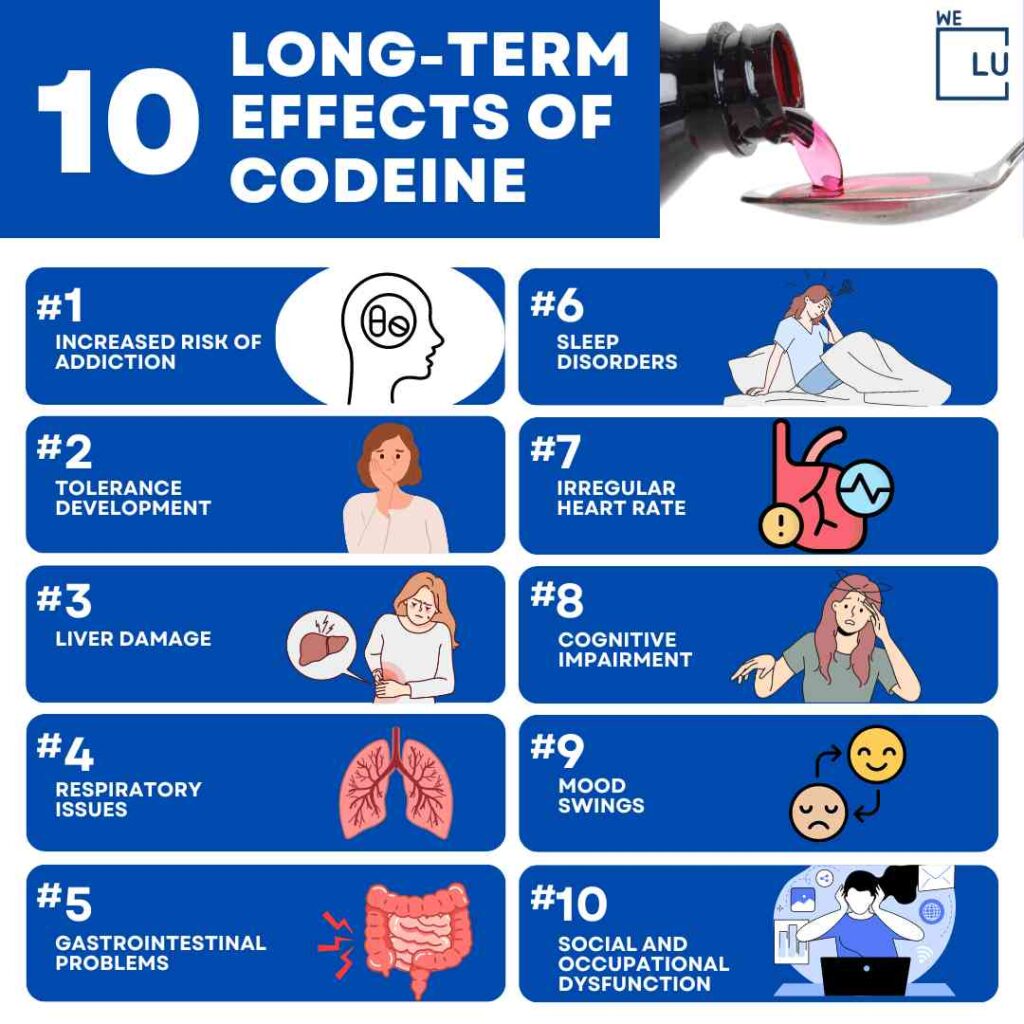
Embed the above “10 Long-Term Effects of Codeine” Infographic to your Website. This infographic is provided by the We Level Up Addiction Treatment Center team. To use the above infographics, you agree to link back and attribute its source and owner at https://weleveluptx.com/codeine-addiction/
10 Long-Term Effects of Codeine image link: https://weleveluptx.com/wp-content/uploads/2024/03/10-Long-Term-Effects-of-Codeine-Codeine-Addiction-Treatment-Codeine-Overdose-Codeine-Withdrawal-Symptoms-Codeine-Detox-1024×1024.jpg
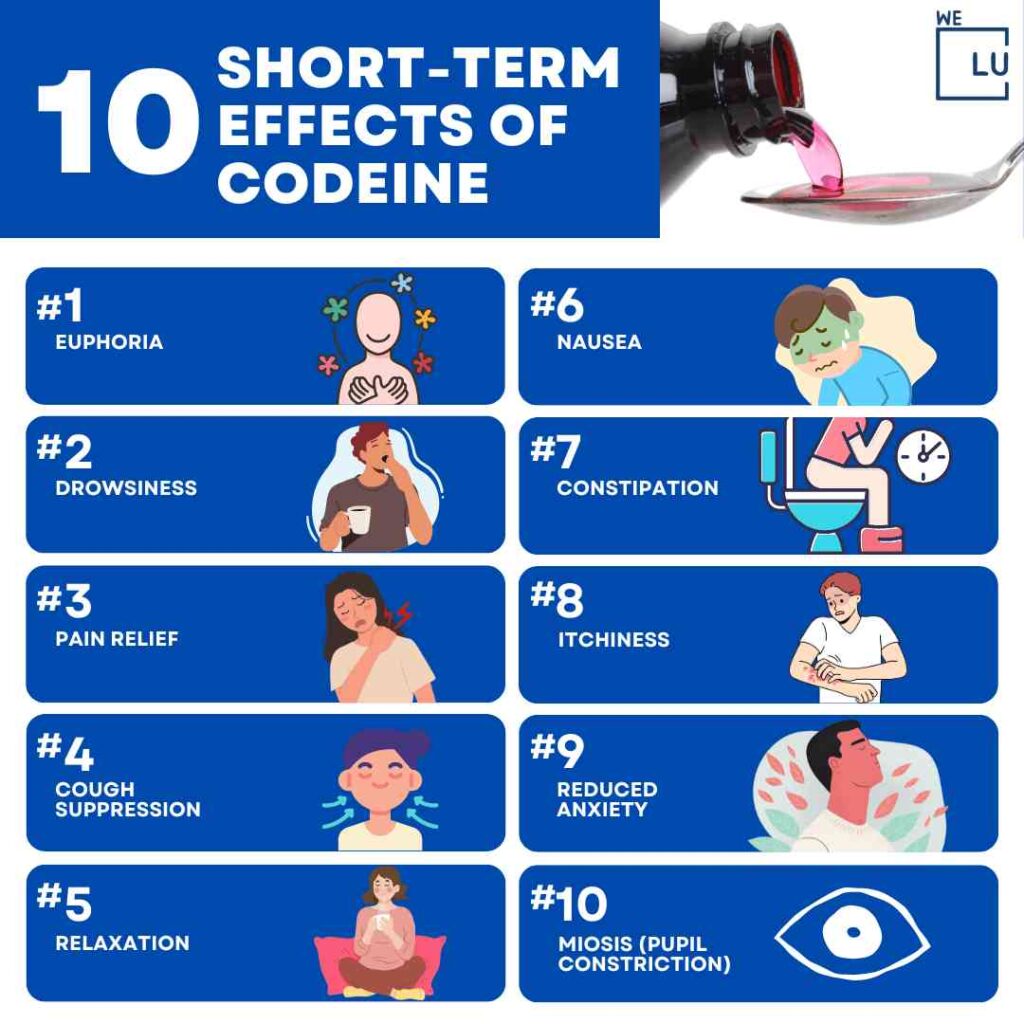
Embed the above “10 Short-Term Effects of Codeine” Infographic to your Website. This infographic is provided by the We Level Up Addiction Treatment Center team. To use the above infographics, you agree to link back and attribute its source and owner at https://weleveluptx.com/codeine-addiction/
10 Short-Term Effects of Codeine image link: https://weleveluptx.com/wp-content/uploads/2024/03/10-Short-Term-Effects-of-Codeine-Codeine-Addiction-Treatment-Codeine-Overdose-Codeine-Withdrawal-Symptoms-Codeine-Detox-1024×1024.jpg
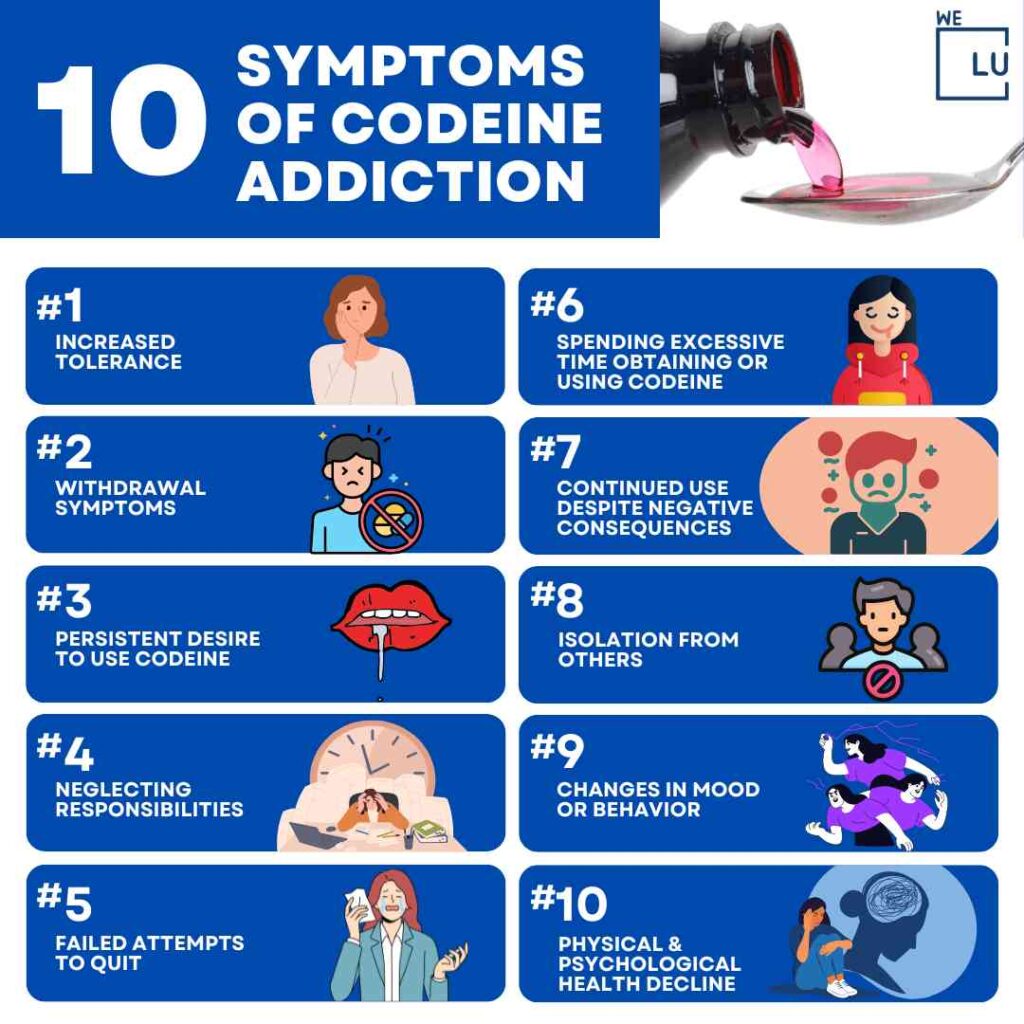
Embed the above “10 Symptoms of Codeine Addiction” Infographic to your Website. This infographic is provided by the We Level Up Addiction Treatment Center team. To use the above infographics, you agree to link back and attribute its source and owner at https://weleveluptx.com/codeine-addiction/
10 Symptoms of Codeine Addiction image link: https://weleveluptx.com/wp-content/uploads/2024/03/10-Symptoms-of-Codeine-Addiction-Codeine-Addiction-Treatment-Codeine-Overdose-Codeine-Withdrawal-Symptoms-Codeine-Detox-1024×1024.jpg
We Level Up Texas Inpatient Codeine Addiction Rehab
At We Level Up Texas codeine addiction rehab, individuals receive intensive treatment and support for overcoming their dependence on codeine. Our cutting-edge detox center and 24-hour nurse care guarantee a secure and cozy setting for relaxation and healing. While detoxing at We Level Up Texas, on-site programs like group therapy, seminars, and workshops may be used. These sessions can provide you with insightful information about your drug usage and long-term recovery techniques.
Assessment and Codeine Detoxification
To ascertain the extent of the person’s addiction and any co-occurring mental health conditions, clients are subjected to a comprehensive evaluation upon admission. Withdrawal symptoms may be managed with the start of a monitored detoxification procedure if needed.
Medical Supervision
Throughout the detoxification and treatment phases, inpatient rehab offers round-the-clock medical care to guarantee clients’ safety and well-being.
Individualized Codeine Addiction Treatment Plan
Everybody’s requirements and circumstances are considered while creating a tailored treatment plan. Support groups, medicinal treatments, therapy, and counseling might all be a part of this approach.
Therapy and Counseling
Different treatment modalities are frequently used to address the psychological components of addiction, including motivational enhancement therapy and cognitive-behavioral therapy (CBT). Individuals who are addicted to codeine can examine the root causes of their problem and learn coping skills during counseling sessions.
Group Support
Individuals may share their stories, pick up tips from others, and get support from peers going through similar struggles in the safe and encouraging setting of group therapy sessions.
Education Programs for Opioid Addiction
Long-term recovery tactics, the nature of addiction, and its impact on the body and mind are all topics covered in educational components of rehab programs.
Aftercare Planning
A thorough aftercare plan is created as the inpatient program draws to a close to assist patients in returning to their regular lives. Support groups, continuing follow-up treatment, and ongoing therapy may be part of this.
Family Involvement
To address how addiction affects family relationships and to give the recovering person a network of support, several treatment programs include family therapy sessions.
Dedication and continuous assistance are essential for a successful recovery. A person’s journey does not end with inpatient rehab; after leaving We Level Up Texas inpatient codeine rehab, clients can continuously benefit from ongoing aftercare and social support.
Are you seeking codeine rehab centers near me? Get a free rehab insurance check without any obligation. The result can help you explore several treatment options.
How Long Do Opiates Stay in Your System (Urine, Blood, Hair, and Saliva) Informative Video
Start a New Life
Begin with a free call to an addiction & behavioral health treatment advisor. Learn more about our dual-diagnosis programs. The We Level Up treatment center network delivers recovery programs that vary by each treatment facility. Call to learn more.
- Personalized Care
- Caring Accountable Staff
- World-class Amenities
- Licensed & Accredited
- Renowned w/ 100s 5-Star Reviews
We’ll Call You
Search We Level Up Texas Codeine Addiction Treatment, Detox Topics, and Resources
Sources
- Can you get addicted to codeine? Peechakara BV, Tharp JG, Gupta M. Codeine. [Updated 2023 Feb 13]. In: StatPearls [Internet]. Treasure Island (FL): StatPearls Publishing; 2023 Jan-. Available from: https://www.ncbi.nlm.nih.gov/books/NBK526029/
- McKay DR, Peters DA. What is ‘Lean’? An overview and its emerging role in health care. Plast Surg (Oakv). 2015 Summer;23(2):116-8. Doi: 10.4172/plastic-surgery.1000922. PMID: 26090356; PMCID: PMC4459408. https://www.ncbi.nlm.nih.gov/pmc/articles/PMC4459408/
- Purple drink prevalence and characteristics of misusers of codeine cough syrup mixtures https://www.sciencedirect.com/science/article/abs/pii/S0306460313000920.
- Lee E, Cooper RJ. Codeine Addiction and Internet Forum Use and Support: Qualitative Netnographic Study. JMIR Ment Health. 2019 Apr 25;6(4):e12354. Doi: 10.2196/12354. PMID: 31021328; PMCID: PMC6658256. https://www.ncbi.nlm.nih.gov/pmc/articles/PMC6658256/
- Shah M, Huecker MR. Opioid Withdrawal. [Updated 2023 Jul 21]. In: StatPearls [Internet]. Treasure Island (FL): StatPearls Publishing; 2023 Jan-. Available from: https://www.ncbi.nlm.nih.gov/books/NBK526012/
- Peechakara BV, Tharp JG, Gupta M. Codeine. [Updated 2023 Feb 13]. In: StatPearls [Internet]. Treasure Island (FL): StatPearls Publishing; 2023 Jan-. Available from: https://www.ncbi.nlm.nih.gov/books/NBK526029/
- Dean L, Kane M. Codeine Therapy and CYP2D6 Genotype. 2012 Sep 20 [Updated 2021 Mar 30]. In: Pratt VM, Scott SA, Pirmohamed M, et al., editors. Medical Genetics Summaries [Internet]. Bethesda (MD): National Center for Biotechnology Information (US); 2012-. Available from: https://www.ncbi.nlm.nih.gov/books/NBK100662/
- Codeine overdose: MedlinePlus Medical Encyclopedia – MedlinePlus (.gov) U.S. Department of Health and Human Services National Institutes of Health
- Jahan AR, Burgess DM. Substance Use Disorder. [Updated 2023 Jul 21]. In: StatPearls [Internet]. Treasure Island (FL): StatPearls Publishing; 2023 Jan-. Available from: https://www.ncbi.nlm.nih.gov/books/NBK570642/
- Blanco C, Wiley TRA, Lloyd JJ, Lopez MF, Volkow ND. America’s opioid crisis: the need for an integrated public health approach. Transl Psychiatry. 2020 May 28;10(1):167. Doi: 10.1038/s41398-020-0847-1. PMID: 32522999; PMCID: PMC7286889. https://www.ncbi.nlm.nih.gov/pmc/articles/PMC7286889/
- Dydyk AM, Jain NK, Gupta M. Opioid Use Disorder. [Updated 2023 Jul 21]. In: StatPearls [Internet]. Treasure Island (FL): StatPearls Publishing; 2023 Jan-. Available from: https://www.ncbi.nlm.nih.gov/books/NBK553166/
- Berge KH, Seppala MD, Lanier WL. The anesthesiology community’s approach to opioid- and anesthetic-abusing personnel: time to change course. Anesthesiology. 2008 Nov;109(5):762-4. Doi: 10.1097/ALN.0b013e31818a3814. PMID: 18946282. https://pubmed.ncbi.nlm.nih.gov/18946282/


